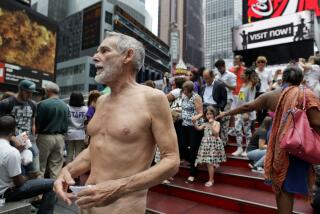Condomania Arrives for the Age of Safe Sex
- Share via
Everywhere Butch Kirby turned there were condoms.
There were glow-in-the-dark condoms. Mint condoms. Hypo-allergenic condoms. Condoms from Sweden and Germany. Yuppie condoms. Condom earrings. Condom T-shirts.
It was opening day for Condomania, a Melrose store specializing in, well, you guessed it. But beyond those rows and rows of little square packets, nothing in the store betrayed its mission. The walls were awash in neon and Keith Haring and rock music pounded the air.
It’s all part of a young entrepreneur’s strategy to wrest the condom market from the uncomfortable clutches of sleaze on one end and pharmacists on the other. He wants to strip consumers of their inhibitions. He wants to take the smut out of selling safe-sex stuff, to give the entire operation that invaluable sheen, that elusive je ne sais quoi : Class.
“It had to feel like a store which was not only very trendy and hip, but a store that with a blink of an eyelash could also be selling $500 handbags,” says owner Adam Glickman, whose condom ventures grossed about a million dollars in the past year. “We had to take the condom and go to as opposite end of the spectrum as possible and make it a glamorous item, make condoms really cool and glamorous and fun.”
And, most of all, not embarrassing to buy, which continues to be the condom’s lowly legacy despite these harsh days of AIDS and sexually transmitted diseases.
Still, despite the store’s master plan to make shopping painless, customer Butch Kirby, 25, stared at a wall of prophylactics Sunday, a worried look on his face.
“Wouldn’t you be embarrassed,” mused Kirby, “to buy any size other than large?”
If you were to meet Adam Glickman, 24, the words condom salesman probably wouldn’t spring to mind.
He grew up well off and well educated, the son of a New York City real estate financier and an artist, the product of private schooling and the Ivy League. Despite his claim to privilege, Glickman always had an itch to make money. First it was selling lemonade and hot chocolate, a quaint rite of childhood just about everywhere-- except New York.
As a senior at the elite Dalton School, Glickman graduated to serious entrepreneurship. He marketed white boxer shorts imprinted with the Dalton insignia, dubbed Daltundies. Later, at Tufts University, Glickman created Tufts boxer shorts. Then it was futons.
But by 1988 Glickman had seen the future and it was safe sex.
“College students were walking around thinking that they were completely invulnerable,” he says. “In 1988, when you said condom people immediately thought sex shops and Hustler magazine. It was still associated with the Dark Porno Age.”
In addition to the sleaze factor, condoms had another image problem on campus. “I think it’s highly psychological and emotional that if a guy’s wearing a condom there’s this raw essence thing missing,” Glickman says. “So I said to myself, ‘There are Tufts T-shirts and Tufts boxer shorts, Tufts bookbags and Tufts Frisbees. Why not a Tufts condom?’ ”
The strategy was to disarm would-be customers by ditching the condom’s ignoble image. Tufts condoms would even be fun before they were opened. The condoms were tucked into matchbook covers embellished with a cartoon of an elephant--the Tufts mascot--and the slogan: “A Safe Jumbo Is a Happy Jumbo.”
Glickman says he sold 500 Jumbo condoms in 10 days. One birth was linked to the Jumbos--Custom Condoms, a company Glickman started with a friend, Davin Wedel.
Glickman even studied condoms. He produced a 50-page college paper on the subject titled: “Condoms: The Private Sphere and the Public Domain.”
“Sex was something that was a private issue,” he says. “Condoms, however, is a very public issue. You have to confront a salesclerk. You have to talk to your partner about them. For some reason, it seems that it was easier for most Americans to have sex than talk about it.”
Glickman also found that black youths were even less likely to use condoms than the general population. (Twelve percent of heterosexual couples in the United States use condoms, he says, although industry estimates range as high as 50%.) So his company packaged Homeboy Condoms, endorsed by then up-and-coming rap group 2 Live Crew.
After Glickman graduated in 1989, he and Wedel set up shop in a tiny office outside Boston. There, Custom Condoms pioneered its bestseller, glow-in-the-dark Knight Lights, Glickman says. More than a million of them have glowed green (other colors are toxic) around the world, he says.
Glickman had visited condom stores in Europe, which tended to have a more clinical atmosphere than the store he envisioned. Seattle had also had a condom store since 1975, although the nonprofit Rubber Tree has prided itself on its no-frills style.
Glickman believed in plenty of frills and adequate profit, and he found a like spirit in Suzi Landolfi, 41, a safe-sex stand-up comedian who delivers bawdy instruction at college campuses and concert halls. They opened the first Condomania in New York’s West Village in February--but not until they’d been rebuffed by 15 prospective landlords. Even the one who said yes has the option to kick out the store if it sells anything the landlord finds offensive.
Condomania, which bills itself as the only glitzy store of its kind, carries 200 different types of condoms as well as flavored lubricants and nutty novelties like Happy Sperm Soap on a Rope. Prices range from 50 cents to $35 for a condom-shaped computer cover. (Not all condoms the store carries are approved by the FDA for contraception.)
The store encourages customers, who are mostly women under 30, to examine its wares. “Like shoes, not any one condom is right for everybody,” Glickman says.
Glickman says lines trail out his New York store on Saturday nights, and his two businesses have grossed $1 million over the past year. After Los Angeles and New York, Condomania plans to conquer the world: the San Francisco store is scheduled to open Feb. 1, followed within the year by six company-owned stores nationwide. Plans are also afoot to award franchises, to start a mail-order catalogue and to deploy carts in shopping malls.
Such success has drawn fire from critics who say Condomania is capitalizing on the AIDS tragedy.
“What we’re about is taking the condom and making it a healthy part of everybody’s sex life, almost like vitamins,” Glickman says.
And if his companies make a million bucks along the way, so much the better. Because Glickman is nothing if not the quintessential man for the ‘90s. If the ‘60s was the decade of doing good, and the ‘80s was the decade of making money, then the ‘90s is the decade for making money doing good. It’s OK to make a million, if you make it selling Rainforest Crunch.
“Now it’s so socially hip to be involved,” says Glickman, who donates condoms to social groups. “Condoms or no condoms, we couldn’t have been around five years ago.”
The store’s marketing twist is earning high marks from the health and business worlds.
“We’re actually very excited about it because the only thing we have to prevent the spread of AIDS is safer sex and that involves condoms,” says Anthony Sprauve, spokesman for AIDS Project Los Angeles.
“I think that’s a great market position because he’s not only being a good merchant in terms of the highly elevated presentation, he’s also doing a public service and reeducating the perception of condoms,” says consultant Larry Ebel.
In Glickman’s perfect universe, other condom stores may come along, but there will only be one Condomania chain. “I guess I want to be kind of The Gap of condom stores,” he says wistfully.
But Glickman can see even beyond his future as the condom prince of shopping malls. Upper East Side, here he comes.
“You go to a department store and see the Chanel counter. Maybe a few years from now you’ll go to Bloomingdale’s and see the Condomania counter. For a place like Bloomingdale’s to do it would be a huge leap. But it’s down the road. It’s gonna happen.”






